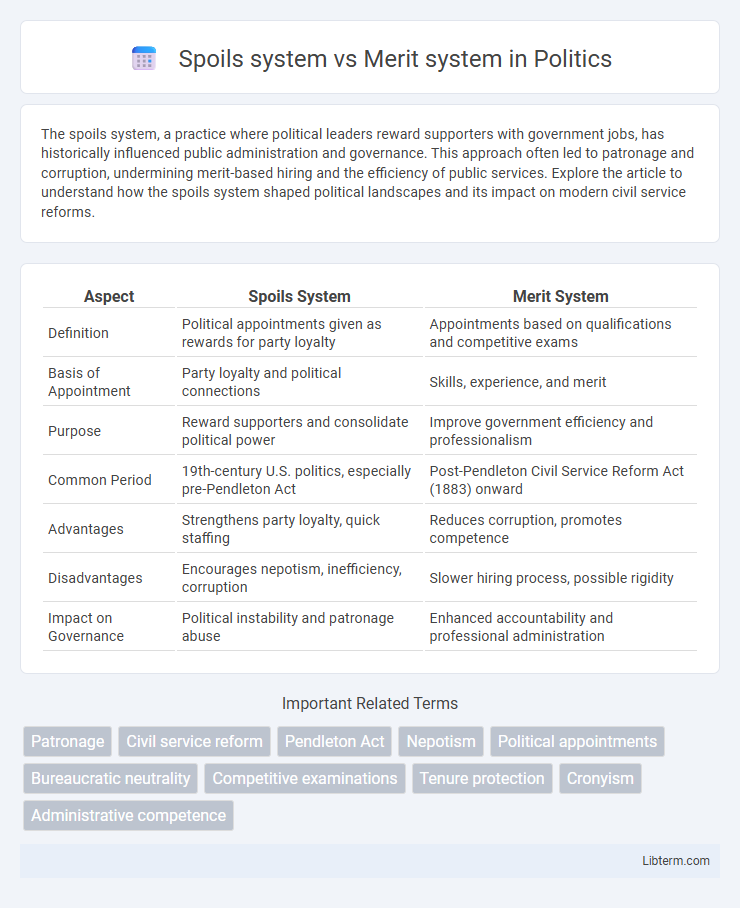The spoils system, a practice where political leaders reward supporters with government jobs, has historically influenced public administration and governance. This approach often led to patronage and corruption, undermining merit-based hiring and the efficiency of public services. Explore the article to understand how the spoils system shaped political landscapes and its impact on modern civil service reforms.
Table of Comparison
| Aspect | Spoils System | Merit System |
|---|---|---|
| Definition | Political appointments given as rewards for party loyalty | Appointments based on qualifications and competitive exams |
| Basis of Appointment | Party loyalty and political connections | Skills, experience, and merit |
| Purpose | Reward supporters and consolidate political power | Improve government efficiency and professionalism |
| Common Period | 19th-century U.S. politics, especially pre-Pendleton Act | Post-Pendleton Civil Service Reform Act (1883) onward |
| Advantages | Strengthens party loyalty, quick staffing | Reduces corruption, promotes competence |
| Disadvantages | Encourages nepotism, inefficiency, corruption | Slower hiring process, possible rigidity |
| Impact on Governance | Political instability and patronage abuse | Enhanced accountability and professional administration |
Introduction to the Spoils System and Merit System
The Spoils System, rooted in 19th-century American politics, involved awarding government jobs to political supporters and loyalists, prioritizing party allegiance over qualifications. In contrast, the Merit System bases hiring and promotions on candidates' skills, education, and performance, aiming to enhance efficiency and reduce corruption in public administration. These opposing approaches reflect fundamentally different principles in public service recruitment and management.
Historical Origins of the Spoils System
The Spoils System originated in the United States during Andrew Jackson's presidency in the 1820s, where government jobs were awarded based on political loyalty rather than qualifications, reinforcing partisan control. This practice institutionalized patronage by distributing public office as a reward for electoral support, often leading to inefficiency and corruption. The historical impact of the Spoils System prompted the later development of the Merit System, emphasizing competence and impartiality through competitive examinations.
Evolution of the Merit System in Public Administration
The evolution of the merit system in public administration marked a significant shift from the spoils system, emphasizing competence and qualifications over political connections in government hiring practices. Key developments include the Pendleton Civil Service Reform Act of 1883, which established competitive exams and protections against arbitrary dismissal, ensuring a more professional and non-partisan bureaucracy. Over time, the merit system has expanded to include performance evaluations and continuous training, promoting efficiency and accountability in public sector employment.
Key Differences Between Spoils and Merit Systems
The spoils system awards government jobs based on political loyalty and patronage, often leading to inefficiency and corruption, while the merit system emphasizes qualifications, skills, and performance through competitive examinations and standardized evaluations. Unlike the spoils system's tendency to replace employees with each new administration, the merit system ensures job stability and professional development regardless of political changes. These key differences impact the quality of public service and the integrity of government operations, with the merit system fostering competence and accountability over partisan influence.
Advantages and Disadvantages of the Spoils System
The spoils system offers advantages such as rewarding political supporters with government jobs, which can increase party loyalty and ensure administrative alignment with elected officials, but it often leads to corruption, inefficiency, and unqualified personnel filling critical roles. This patronage approach can undermine public trust and hinder long-term governmental stability due to frequent turnover and lack of merit-based standards. Conversely, the merit system promotes competency and professionalism by hiring and retaining employees based on qualifications, reducing favoritism and improving administrative effectiveness.
Benefits and Criticisms of the Merit System
The merit system enhances government efficiency by promoting employees based on ability and performance rather than political connections, leading to a more competent and professional workforce. It reduces corruption and favoritism, fostering fairness and equal opportunity within public service recruitment and promotion. Critics argue the merit system can create rigidity, hinder political responsiveness, and sometimes prioritize technical skills over values or loyalty necessary for certain governmental roles.
Impact on Government Efficiency and Accountability
The spoils system often decreases government efficiency by prioritizing political loyalty over qualifications, leading to less competent public administration and increased corruption risks. In contrast, the merit system enhances efficiency by promoting employees based on skills and performance, thereby improving accountability and reducing favoritism in government operations. Implementing a merit-based approach strengthens institutional integrity and ensures more effective public service delivery.
Case Studies: Spoils vs Merit Systems in Practice
The Pendleton Civil Service Reform Act of 1883 exemplifies a transition from the spoils system to a merit-based system, establishing competitive exams to secure government positions and reducing patronage. In contrast, the early 19th-century U.S. government under Andrew Jackson showcased the spoils system, where political supporters were rewarded with public office regardless of qualifications, often leading to inefficiency and corruption. Modern bureaucracy predominantly employs merit systems, as seen in countries like Australia and Canada, promoting competence and accountability through structured recruitment and performance evaluations.
Reforms and Modern Trends in Civil Service Systems
Reforms in civil service systems have increasingly shifted focus from the Spoils system, characterized by political patronage, toward the Merit system, emphasizing qualifications and performance-based hiring. Modern trends highlight the integration of technology and data analytics to enhance transparency, efficiency, and fairness in recruitment and promotion processes. Emphasis on continuous professional development and accountability mechanisms further supports the Merit system's adaptability to contemporary public administration challenges.
Conclusion: Which System Best Serves Public Interest?
The merit system best serves the public interest by promoting efficiency, professionalism, and fairness in government employment. Unlike the spoils system, which prioritizes political loyalty and often leads to corruption and inefficiency, the merit system ensures qualified candidates are selected based on competence. This fosters a stable and effective public workforce dedicated to serving citizens rather than partisan agendas.
Spoils system Infographic

 libterm.com
libterm.com